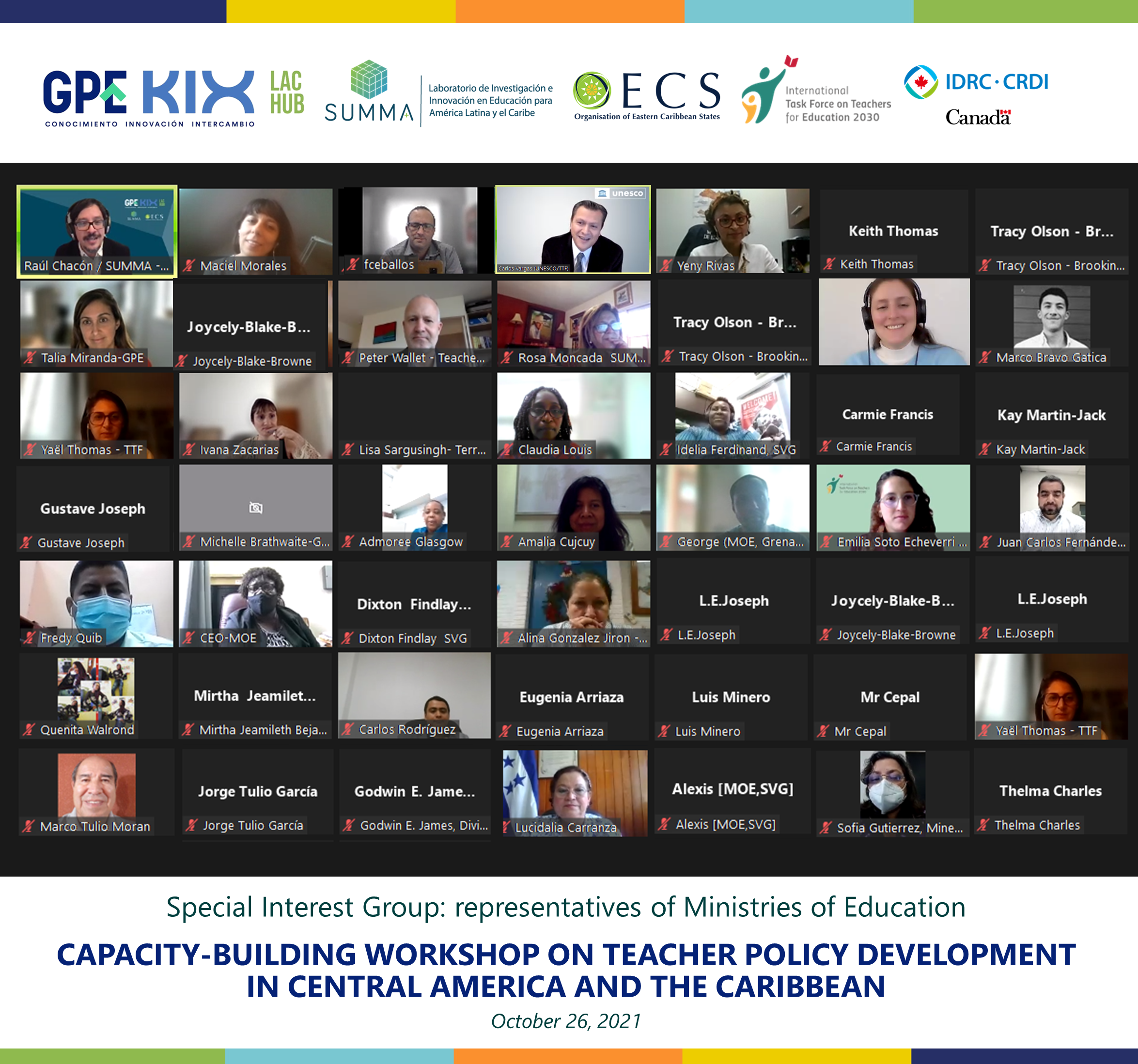COMPARTIR
Workshop on “Capacity building for the development of teacher policies in Central America and the Caribbean”
October 28, 2021
The workshop on “Capacity building for teacher policy development in Central America and the Caribbean” was organized by SUMMA, the Organization of Eastern Caribbean States -OECS-, IDRC, and co-organized by KIX LAC and UNESCO.
The main objective of the workshop was to strengthen knowledge and understanding of the process of development, dimensions and implementation of a teacher policy presented in the “Teacher Policy Development Guide” (2019), a tool designed by the International Task Force on Teachers too assist national policy- and decision-makers and education officials to develop an informed teacher policy as an integrated component of national education sector plans or policies, aligned to national development plans and strategies.
Raúl Chacón, Director of KIX LAC, welcomed and thanked the more than 59 participants, representatives of the Ministries of Education of El Salvador, Grenada, Guatemala, Guyana, Haiti, Honduras, Nicaragua, Saint Lucia, Saint Vincent and the Grenadines, for their participation, pointing that “it is essential to have a space like this for dialogue between representatives of ministries of education to learn about the efforts that countries are making in teacher policy. I would like to highlight the need to include teachers, unions and trade unions in discussions within countries on teacher development from the initial stages, and to be able to consider the multiple perspectives to address the challenges faced by public policy makers and implementers. This is because decision making is not reduced to simplifying the evidence, but to a conscious exercise of asking how that evidence is effectively linked to political decision making processes.
According to data from the GEM Report (UNESCO/SUMMA), teachers need more support to face the challenge of diversity and are often not offered opportunities for continuous professional development. Despite the fact that 70% of the countries in the region have laws or policies that provide for teacher training on inclusion, more than 50% reported that they lacked professional training to teach students with special needs.
Likewise, the main challenges for teacher training include the lack of a professional degree, the lack of teachers in rural schools, the low number of teachers in certain disciplines and few requirements to enter the teaching career.
Florencio Ceballos, IDRC Senior Program Specialist, said that “today’s meeting is very important and we are glad to have the voice of all the Ministries, since many times decisions and policies are generated based only on evidence, but we believe that it is even more important to generate spaces for common dialogue and to generate more inclusive discussion processes, incorporating other actors and other voices to these processes”. During the workshop, discussions were held on the current situation in the countries and the projects that are being carried out to improve the professional development of teachers.
Dr. Carlos Vargas Tamez, Chief of UNESCO’s Section for Teacher Development and of the Secretariat of the International Working Group; Peter Wallet, program specialist and Emilia Soto from Teachers for Education 2030 (TTF), presented the Guide, which detailed the following dimensions: teaching standards, equitable distribution, employment and working conditions, rewards and remuneration, and professional development.
The following participated in the meeting: Talia Miranda (GPE); Jesica Medina (Honduras); Lucidalia Carranza (Honduras); Michelle Brathwaite and Glenroy George (Grenada); Quenita Walrond Lewis (Guyana); Talia Miranda, Senior Education Specialist (TTF); Keith Thomas; Dixton Findlay and Idelia Ferdinand (St. Vincent and the Grenadines); Claudia Louis (St. Lucia); Gustave Joseph and Bayard Lapommeray (Haiti); Yeni Rivas, Juan Carlos Fernández and Carlos Rodríguez (El Salvador); Amalia Cujcuy Colaj, Rossen Jenniffer Mirón, Idania Vanessa Lopez and María Angélica Morales (Guatemala); Luis Minero (El Salvador); Alina Gonzalez, Mirtha Bejarano and Martha Illescas (Nicaragua).
